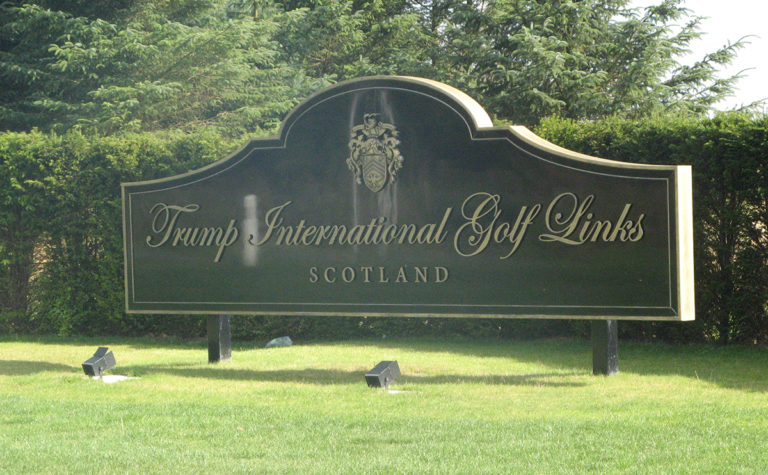Policymakers have betrayed Scotland’s natural heritage over sand dunes destroyed by Trump golf course

Scotland’s Nature Agency yesterday confirmed that sand dunes around the Trump International golf course in Aberdeenshire have been stripped of their protected status as a result of the destructive damage that has been caused to them.
It is the latest development in a depressing saga during which the inflated ambitions of the Trump Organization’s golf course empire have been given priority over the preservation of Scotland’s natural heritage.
NatureScot has confirmed that the dunes around the golf course at the Menie Estate are no longer part of the Foveran Links Site of Special Scientific Interest (SSSI). The decision follows the discovery in 2016 that the construction of the course had “partially destroyed” the site’s natural features.
Announcing the move, Eileen Stuart, NatureScot’s Interim Director of Nature and Climate Change, said: “There is now no longer a reason to protect the dunes at Menie as they do not include enough of the special, natural features for which they were designated.”
This decision raises serious questions about the commitment of the Scottish Government to valuing and protecting its wildlife and landscapes. Its Environment Strategy, published earlier this year, states: “It is essential to understand the impacts of our economic activities on Scotland’s natural capital, and to design our business models to regenerate rather than deplete it.”
But at every turn since the proposal for the golf course was submitted in November 2006, national and local policymakers have been lured by the Trump Organization’s promises of an economic boom from the golf course.
Scottish Ministers called in the decision and granted the application in 2008 on the recommendation of a public local inquiry, which highlighted the benefits to the local economy around the village of Balmedie, located within the constituency of Alex Salmond, then First Minister of Scotland. But they were also warned that the golf course would cause severe damage to the dunes.
Donald Trump submitted a statement to the inquiry in which he claimed that “preserving the sanctity and beauty of the dunes is of great importance to me”, and promised to “ensure that construction is carried out in an environmentally sensitive manner”.
Mr Trump set up the Menie (Links) Environmental Management Advisory Group to “give advice on how to minimize adverse changes and facilitate good management practices”, but he unilaterally shut it down in 2013, despite the objections of Aberdeenshire Council.
Mr Trump has also attracted controversy because of his attitude towards residents with homes adjacent to the golf course, a conflict which was captured by the documentary ‘You’ve Been Trumped’.
He also fought an unsuccessful battle against the development of a “monstrous” windfarm off the Aberdeenshire coast, which he alleged would upset golfers.
The Trump Organization has been headed by Mr Trump’s sons, Eric and Don Junior, since his inauguration as President. It is not known if he will take the helm again in January next year after he leaves office following his heavy defeat to Joe Biden in last month’s election.
During the past year, while the decision to strip the dunes of their status was being considered, I made the case to NatureScot that it would be premature to end their protection because they might recover if the golf course is removed in the future.
I also wrote, in 2018, to Roseanna Cunningham, Cabinet Secretary for Environment, Climate Change and Land Reform, to ask for an investigation into whether Trump International Golf Links Scotland (TIGLS) had caused more damage than necessary to the dunes. I was told that it was a matter for Aberdeenshire Council, so I wrote to its Chair, Bill Howatson, with the same request, but I did not even receive a reply.
In September 2020, the Council granted a further application from TIGLS to build a second 18-hole golf course, even though Scottish Natural Heritage had pointed out that it might result in further damage to the dunes.
The decision to end the protected status of the dunes means that the TIGLS is under no legal obligation to take special care not to destroy them during future work.
The decision letter indicated that permission was given because the new golf course “will contribute towards the significant social and economic benefits expected to be delivered by the wider development proposals within the Menie Estate”.
TIGLS is also being allowed to start construction of 500 residential homes, 50 hotel cottages, a sports centre, and retail, equestrian and commercial spaces, alongside other resort-related leisure facilities.
Ironically, the existing golf course has not been a financial success. According to accounts published by Companies House, TIGLS has recorded a loss of between £1 million and £2 million every year since its first golf course at Balmedie was opened in July 2012, amounting to a seven-year total of £9.5 million by 2018, the last year for which figures are available.
It seems that the Scottish Government and Aberdeenshire Council have decided that the destruction of a unique part of Scotland’s coastline is a price worth paying to help Mr Trump’s business empire.
Bob Ward is a Fellow of the Geological Society and policy and communications director at the Grantham Research Institute on Climate Change and the Environment at the London School of Economics and Political Science.

